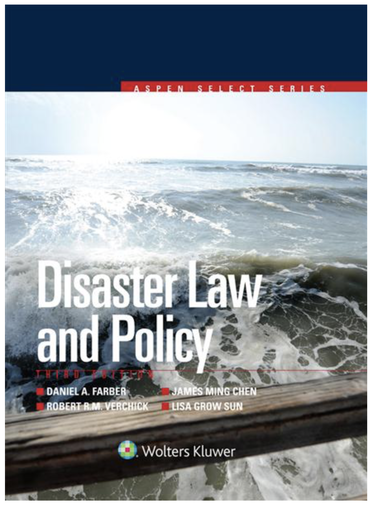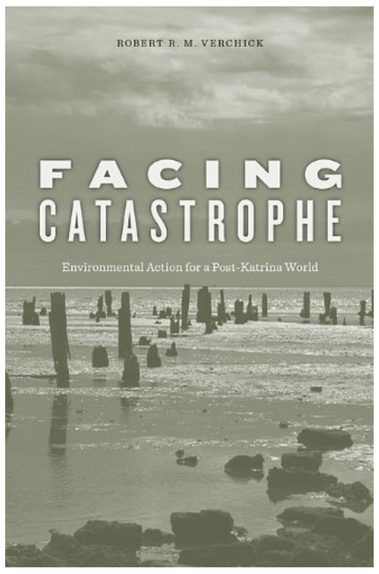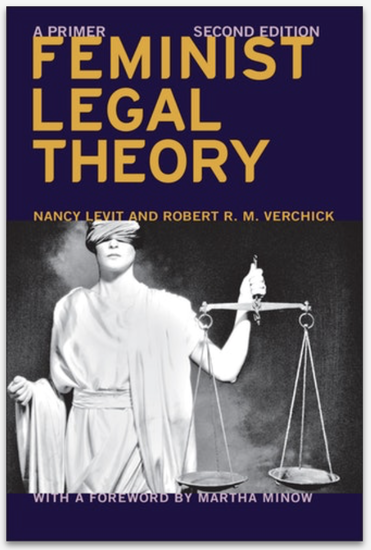|
One morning in Miami Beach, an unexpected guest showed up in a luxury condominium complex’s parking garage: an octopus. The image quickly went viral. But the octopus—and the combination of infrastructure quirks and climate impacts that left it stranded—is more than a funny meme. It’s a potent symbol of the disruptions that a changing climate has already brought to our doorsteps and the ways we will have to adjust.
|
Rob Verchick examines how we can manage the risks that we can no longer avoid, laying out our options as we face climate breakdown. Although reducing carbon dioxide emissions is essential, we need to adapt to address the damage we have already caused. Verchick explores what resilience looks like on the ground, from early humans on the savannas to today’s shop owners and city planners. He takes the reader on a journey into the field: paddling through Louisiana’s bayous, hiking in one of the last refuges of Joshua trees in the Mojave Desert, and diving off Key Largo with citizen scientists working to restore coral reefs. The book emphasizes disadvantaged communities, which bear the brunt of environmental risk, arguing that building climate resilience is a necessary step toward justice.
Engaging and accessible for nonexpert concerned citizens, The Octopus in the Parking Garage empowers readers to face the climate crisis and shows what we can do to adapt and thrive. Available everywhere you buy books from Columbia University Press.
Now available, audiobook version narrarated by Rob Verchick himself!
Engaging and accessible for nonexpert concerned citizens, The Octopus in the Parking Garage empowers readers to face the climate crisis and shows what we can do to adapt and thrive. Available everywhere you buy books from Columbia University Press.
Now available, audiobook version narrarated by Rob Verchick himself!

As the global community struggles to reduce emissions to avoid the worst impacts of human induced climate change, climate disaster law is emerging as a new area of climate law that demands the attention of academics, policymakers and practicing lawyers alike. This book offers critical insights on the key climate issues we will have to contend with in years to come; the scale of which will largely depend on our collective effort to mitigate those issues today!
--Meinhard Doelle, Dalhousie University, Canada
Order on Amazon

A unique and timely text in a burgeoning field, the Third Edition of Disaster Law and Policy takes a broad perspective that looks at the legal and political effects of disasters across the United States and around the world. Authors Daniel A. Farber, James Ming Chen, Robert R.M. Verchick, and Lisa Grow Sun examine the roles of lawyers and government in disaster prevention, emergency response, victim compensation, insurance, and rebuilding strategies.
Order on Amazon

Beautifully written, powerfully argued, and sweeping in its scope, Facing Catastrophe answers the wake-up call for environmental policymakers that was Hurricane Katrina. This is a book that deserves to be read, re-read, and read yet again.
--Douglas A. Kysar, Yale University
The book is an important attempt to, among other things, take the "lessons of Katrina" and make from them a new kind of national policy: one that can calculate the economic value of "natural infrastructure"--like Louisiana's coastal wetlands, which help to diminish the ferocity of incoming hurricanes--and can use that calculation to make saner cost-benefit decisions about our environment.
--Harry Shearer, Huffington Post
Makes a compelling case for reforming disaster policy, making government decision-making more transparent.
--New Orleans Times-Picayune
Order on Amazon

Feminist Legal Theory is essential for all readers. Its comprehensive review of the various types of feminism, feminist history, and the broad range of issues that affect all women and men is impressive. Levit and Verchick’s work has the potential to make feminism not a four-letter word for millennial lawyers but instead a four-word phrase: "Yes, I’m a feminist!" Enjoy!
--Angela Onwuachi-Willig, University of Iowa
In clear, cogent, accessible prose, this book tackles cutting-edge feminist topics . . . . This relatively slim volume has it all. . . . It simultaneously serves as a classic primer on feminist thought and a guide to the emerging issues that will challenge the next generation of feminist theory.
--June Carbone, University of Minnesota Law School
This foundational text offers an outstanding introduction and overview to one of the most important movements in the legal world today: feminist jurisprudence. The authors brilliantly weave together feminism, the law, and our ordinary experiences as men and women to create an accessible text that speaks to students, academics—and anyone who has ever thought about gender issues.
--Naomi Cahn, George Washington University Law School
Order on Amazon
--Angela Onwuachi-Willig, University of Iowa
In clear, cogent, accessible prose, this book tackles cutting-edge feminist topics . . . . This relatively slim volume has it all. . . . It simultaneously serves as a classic primer on feminist thought and a guide to the emerging issues that will challenge the next generation of feminist theory.
--June Carbone, University of Minnesota Law School
This foundational text offers an outstanding introduction and overview to one of the most important movements in the legal world today: feminist jurisprudence. The authors brilliantly weave together feminism, the law, and our ordinary experiences as men and women to create an accessible text that speaks to students, academics—and anyone who has ever thought about gender issues.
--Naomi Cahn, George Washington University Law School
Order on Amazon





